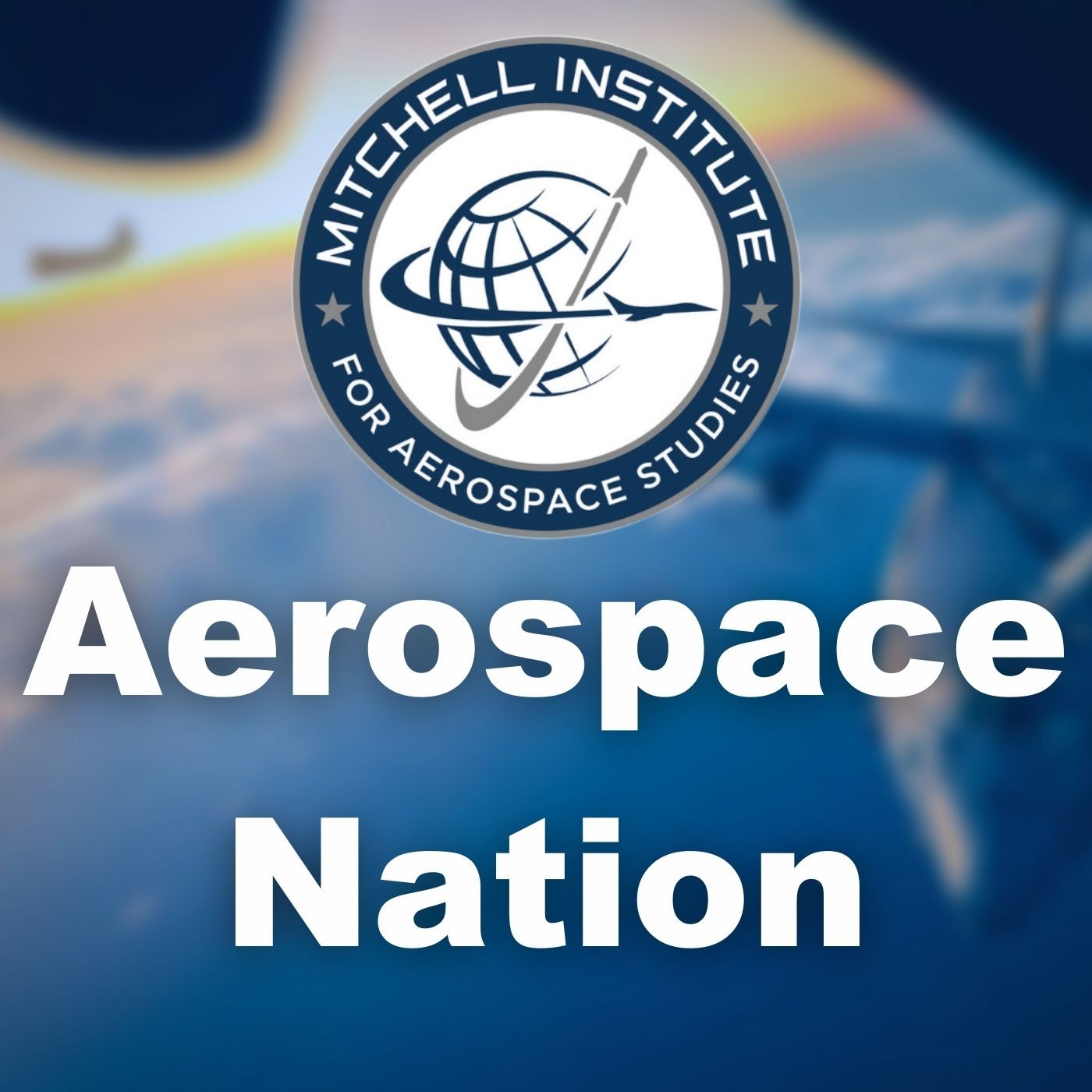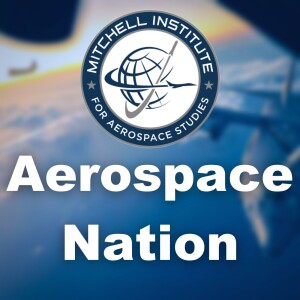
126.1K
Downloads
176
Episodes
The Mitchell Institute hosts some of the most senior leaders and thought influencers of the U.S. Air Force, U.S. Space Force, and Department of Defense for an intimate hour-long discussion on the pressing issues of the hour as well as long-term strategic visions. The live sessions are attended by a broad swath of individuals from the Department of Defense, Capitol Hill, defense industry, and academia who influence defense policy and budget, and they receive wide press coverage.
The Mitchell Institute hosts some of the most senior leaders and thought influencers of the U.S. Air Force, U.S. Space Force, and Department of Defense for an intimate hour-long discussion on the pressing issues of the hour as well as long-term strategic visions. The live sessions are attended by a broad swath of individuals from the Department of Defense, Capitol Hill, defense industry, and academia who influence defense policy and budget, and they receive wide press coverage.
Episodes

Friday Feb 28, 2025
Air Force and Space Force Vectors for the Incoming Trump Defense Team
Friday Feb 28, 2025
Friday Feb 28, 2025
The Department of the Air Force faces a crisis. Decades’ worth of insufficient budgets has slowed essential modernization, necessary capacity and key personnel investments. Air Force and Space Force leaders have warned of these risks for years. However, resource decisions were largely out of their control. As a result, the U.S. Air Force now operates the oldest and smallest aircraft inventory in its history. Combined with a lack of spare parts, an enduring pilot shortage, and falling pilot experience levels, the Air Force finds itself in a precarious condition that portends a national security disaster. The U.S. Space Force, meanwhile, is struggling to meet growing demand for the essential capabilities it provides. One of the biggest challenges: scale. The Space Force is constrained by its size and must grow as rapidly as possible.
The cost to recover the Air Force’s decline and adequately fund the growth of the Space Force will require an increase of at least $45 billion annually for at least the next five years. The Department of the Air Force underpins and enables warfare in every domain, not just air and space. Prioritizing these capabilities can help the Trump defense team achieve its objective of “pursue peace through strength” but doing so requires a new way of doing business and in particular not the conventional stove-piped, “salami slice” budget cutting approach. Using cost-per-effect assessments to make optimal decisions, the new administration can achieve the best use of the nation’s resources. There is no time left to delay reversing the Department of the Air Force’s current course. The fixes must start now, or the United States risks losing the next major war.

Wednesday Feb 19, 2025
Ensuring a Spacepower Advantage in a Prolonged Competition
Wednesday Feb 19, 2025
Wednesday Feb 19, 2025
The Mitchell Institute’s Spacepower Advantage Center of Excellence (MI-SPACE) convened its inaugural space workshop in October 2024. The workshop assembled 55 subject matter experts from across the national security space landscape to examine the Chief of Space Operations’ theory of Competitive Endurance against a set of potential challenges over the next 25 years of competition. The Space Endurance Workshop provided participants with a venue to define the actions, conditions, and effects necessary for the United States, our allies, and partners to preserve U.S. and Coalition leadership in space.
- The Space Force must proactively lead cooperative efforts with Allies and international and commercial Partners to fully integrate and synchronize capability development and operations in a deliberate manner to ensure the most effective and efficient use of resources for all
- Over a protracted competition with China, the ability of the U.S. Space Force, U.S. Space Command, Allies, and Partners to have a spacepower advantage hinges on maintaining popular support and national will
- To gain support and sustain national will, the Space Force must actively and continually articulate why it exists and what it does to Congress, the American people, and even to Guardians
- Given existing policy, budget, and personnel realities, the Space Force’s Theory of Competitive Endurance provides a stable way forward but may create unintended consequences that undermine a warfighting mentality and Guardian identity
- Systemic issues exist within the Space Force and Department of Defense threatening the success of the Space Force in a long-term competition with China, e.g., proper authorities and resources, a lack of clearly defined and understood roles & missions, and a warfighting ethos
- Workshop findings reinforced that existing Space Force lines of effort, such as improved domain awareness, architecture resilience, and security classification reform, are critical and must be expanded to overcome a range of challenges that the United States might face throughout an extended competition
- For the Space Force to succeed as a military service, defensive and offensive counterspace operations must be normalized with warfighting operations to gain superiority like those in all other domains performed by the Air Force, Army, Navy, and Marine Corps

Thursday Jan 23, 2025
Want Combat Airpower? Then Fix the Air Force Pilot Crisis | Policy Paper
Thursday Jan 23, 2025
Thursday Jan 23, 2025
Bottom line, the U.S. Air Force does not have enough pilots to sustain a credible combat force in peacetime, much less during a prolonged high-intensity conflict. History demonstrates that without depth of experienced aircrew, air forces collapse in major conflicts because they cannot continue operations as losses mount. While this crisis extends across the entire pilot force, the shortfall in fighter pilots is especially dire. Solving these challenges will require the Air Force to grow the size of both its aircraft inventory and pilot force, while simultaneously increasing the experience levels of its combat pilots across its Total Force.

Tuesday Jan 21, 2025
A Call for a New NSC-68 and Goldwater Nichols Reform | Policy Paper
Tuesday Jan 21, 2025
Tuesday Jan 21, 2025
Hostile actions by Russia, Iran, and China clearly show that the United States is struggling when it comes to shaping the national security environment and deterring adversaries. The U.S. military no longer has the capability and capacity to defend the rules-based international order that has long been the cornerstone of its foreign policy. Absent a reset, this failure of deterrence could very well lead to a war between the United States and China.
Deficiencies of the 1986 Goldwater-Nichols Reform Act severely restrict the ability on the services to prioritize long-term strategic threats in favor of the immediate, non-combat demands of the combatant commands and civilian defense bureaucracy. Too often, long-term defense procurement strategies and requirements are neglected given these dynamics. The resulting failure of U.S. forces to prudently modernize and recapitalize have emboldened America’s adversaries to use violence to pursue their expansionist goals, setting the United States on a path toward a great power war. To prevent this and retain the current rules-based world order, it is time for a new vector.

Thursday Dec 19, 2024
Frank Kendall | Aerospace Nation
Thursday Dec 19, 2024
Thursday Dec 19, 2024
Whether discussing Operational Imperatives, advancing new technologies like Collaborative Combat Aircraft (CCA), launching Re-Optimization for Great Power Competition, or overseeing dramatic advancement in Space Force capabilities, Secretary of the Air Force Frank Kendall’s tenure will continue to shape the Air Force and Space Force for decades into the future.
Hear from the Secretary as he reflects upon his accomplishments, while also exploring what challenges require continued attention.

Friday Dec 06, 2024
Gen Kevin B. Schneider | Aerospace Nation
Friday Dec 06, 2024
Friday Dec 06, 2024
There’s no question about it: the Indo-Pacific is one of the most impactful theaters around the globe today. Threats posed by adversaries like China and North Korea, challenges and opportunities involved with allies and partners, plus unique factors involved with projecting airpower across a region so large combine to make this area of responsibility incredibly unique.
Listen to learn more about airpower and the Indo-Pacific as we chat with Gen Kevin B. Schneider, Commander of Pacific Air Forces; and Air Component Commander, U.S. Indo-Pacific Command, Joint Base Pearl Harbor-Hickam, Hawaii.

Thursday Dec 05, 2024
Gen. Thomas A. Bussiere | Aerospace Nation
Thursday Dec 05, 2024
Thursday Dec 05, 2024
Global Strike Command uniquely embodies the notion of combat power anytime, anywhere. In command of two legs of the nuclear triad, as well as conventional long-range strike capabilities, Global Strike Command provides decisive combat effects that are foundational to the U.S. for deterrence strategy.

Wednesday Nov 20, 2024
Ms. Katharine Kelley | Schriever Spacepower Series
Wednesday Nov 20, 2024
Wednesday Nov 20, 2024
After 5 years as a service, the U.S. Space Force continues to evolve not only its operations, but also its personnel management strategies. First-of-a-kind legislation has all eyes on the Space Force as it merges part-time and Active-duty military members. As the smallest and newest service, the Space Force is on the cutting edge of multiple personnel initiatives. Ms. Katharine Kelley, the Deputy Chief of Space Operations for Human Capital, walks us through the challenges and opportunities in the people realm of standing up a new military branch.

Tuesday Nov 19, 2024
Dr. Derek Tournear (November 2024) | Schriever Spacepower Series
Tuesday Nov 19, 2024
Tuesday Nov 19, 2024
The Space Development Agency (SDA) is at the forefront of revolutionizing how the Department of Defense acquires, develops, and deploys next-generation space capabilities. SDA is a key element of a space architecture that is more agile and resilient than any before.
Dr. Derek Tournear, the Director of the Space Development Agency, provides updates on SDA’s progress and future plans.

Wednesday Nov 06, 2024
Lt. Gen. Douglas A. Schiess | Schriever Spacepower Series: Lt. Gen. Douglas A. Schiess
Wednesday Nov 06, 2024
Wednesday Nov 06, 2024
As our youngest military branch, the U.S. Space Force is still rapidly evolving to meet the challenges of an increasingly contested space domain. At the heart of this evolution is the newly established U.S. Space Forces – Space (S4S), which serves as the Space Force service component to U.S. Space Command, the newest combatant command.
Listen to our conversation with Lt. Gen. Douglas A. Schiess, the inaugural commander of S4S, as he takes us through the journey of its stand-up, its make-up, and a look to its future.
